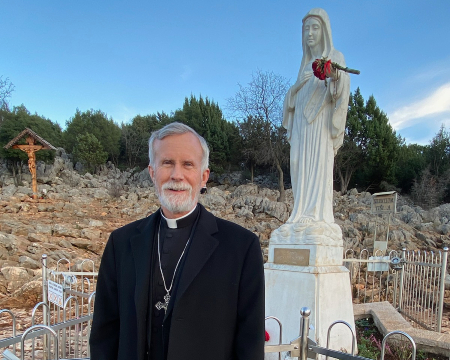Antonio Vieira
FREE Catholic Classes
Missionary, diplomat, orator, b. at Lisbon, 6 February, 1608; d. at Bahia, Brazil, 18 July, 1697. Brought when a child to Bahia, he studied under the Jesuits, and entered the Society of Jesus in 1623, pronouncing his first vows in 1625. At eighteen he was teaching rhetoric, and shortly after writing commentaries on the "Canticle of Canticles ", the tragedies of Seneca, and the "Metamorphoses" of Ovid. Ordained priest in 1635, he immediately astounded all by his eloquence. When the Dutch besieged Bahia (1640), he delivered his "Discourse for the Success of the Portuguese Arms", called by the sceptical Raynal the most extraordinary outburst of Christian eloquence. Portugal, under John IV, had thrown off the Spanish yoke in 1640. The following year Vieira went to Lisbon with young Mascarenhas, whom the viceroy had commissioned to assure the new king of the loyalty of the colonists. John, recognizing the Jesuit's merit, made him tutor to the Infante Dom Pedro, court preacher, and a member of the Royal Council. Vieira did efficient work in the War and Navy Departments, revived commerce, urged the foundation of a national bank and the organization of the Brazilian Trade Company. A champion of freedom, he maintained that no citizen should be exempt from taxation, and denounced the severity of the Portuguese Inquisition. He advocated a purely defensive war with Spain, and to his skilful plans are partly due the victories on Elvas, Almeixal, Castello-Rodrigo, and Montes-Claros.
At different periods (1646, 1647, 1650) John IV sent Vieira on diplomatic missions, to Paris, The Hague, London, and Rome. The Jesuit little relished such honours, and steadily refused the official title of ambassador and the offer of a bishopric. In 1652 he returned to Maranhâo. But so fearless were his denunciations of the slave owners and their excesses that in 1654 he was obliged to return to Lisbon, where he pleaded the cause of the outraged Indians. He was successful, and sailed for Brazil in 1655. Six years he worked for the Indians, translating the Catechism into their rude idioms, teaching them the arts of peace, travelling hundreds of miles on the Amazon and its tributaries, winning even the fierce Nheengaibas by his eloquence, but again arousing the hatred of the slave owners, who in 1661 "exiled" him to Lisbon. The corrupt Alphonso VI had succeeded John IV, and Vieira found many enemies at Court. For his leniency to the converted Jews, for alleged doctrinal errors, for his ultra-patriotic "Sebastianism", and his too credulous acceptance of the prophecies of Bandarra, who foretold a millennium in which Portugal and the Church should rule the world, for his harmless, but extravagant, "As Esperanças do Portugal " and "Clavis Prophetarum", he was condemned by the Portuguese Inquisition, forbidden to preach, and kept a prisoner from Oct., 1665, to Dec., 1667. Under Pedro II the Inquisition reversed it sentence. But Rome was a safer residence, and from 1669 to 1675 he found there an enthusiastic welcome. Clement X, the cardinals, his general, the great preacher Oliva, that erratic princess Christine of Sweden, who vainly begged him to become her director, and high and low were fascinated by his eloquence. But Vieira, amid his triumphs, longed for his Indians of Maranhao, and after a brief stay in Portugal sailed for South America in 1681. Trial and tribulation again faced him. Worn out by his labours as preacher, superior, and visitor of the missions, slanderously accused of conniving at the murder of a colonial official, denounced to his superiors for illegal canvassing in a provincial congregation of his order, and cleared of the charge only when in his grave, he died, sorrowing, but unbroken, in his ninetieth year. The slaves and the poor were his chief mourners.
Vieira is one of Portugal's greatest figures in the seventeenth century. Southey (History of Brazil ) calls him one of the greatest statesmen of his country. A thorough-going Jesuit, Vieira was also a progressive administrator with large and democratic views. His character, though streaked with a vein of extravagance, was of the noblest. He had lofty conceptions, and, in their execution, was independent and bold. In the midst of courts, he remained humble and mortified. He had one dream, to see Portugal the standard- bearer of civilization and Christianity in the old and new world. As a prose writer he is perhaps the greatest Portugal has produced. As an orator he is undoubtedly one of the world's masters, equally great in the cathedrals of Europe and the rude shrines of Maranhao. He is not free from the bad taste and artificial "gongorism" imported from Spain, but he is clear, popular, and practical, profoundly original and frequently sublime. In this respect he does not suffer by comparison with Bossuet himself. He has variety, dialectical skill, imaginative colouring, pathos, power, and even humour. He is amazingly fertile; he has, for instance, 30 sermons on the Rosary, 18 on Saint Francis Xavier, 14 on the Eucharist. He had mastered the Scriptures, and his interpretations, if forced at times, are always striking. Vieira's works have been frequently published, as for example, "Obras Completas" (Lisbon, 1854), fairly complete with 15 volumes of sermons alone, 500 letters, etc.; this edition, however, omits many manuscripts kept in the British Museum and the National Library, Paris ; "Obras Completas" (Porto, 1907); "Sermões Selectos" (6 vols., 1852-53); "Cartas" (3 vols., Lisbon, 1735). For a complete list of Sommervogel and Cabral's fine work, "Vieira Pregador".
We ask you, humbly: don't scroll away.
Hi readers, it seems you use Catholic Online a lot; that's great! It's a little awkward to ask, but we need your help. If you have already donated, we sincerely thank you. We're not salespeople, but we depend on donations averaging $14.76 and fewer than 1% of readers give. If you donate just $5.00, the price of your coffee, Catholic Online School could keep thriving. Thank you.Help Now >









 Daily Readings for Saturday, April 20, 2024
Daily Readings for Saturday, April 20, 2024 St. Marian: Saint of the Day for Saturday, April 20, 2024
St. Marian: Saint of the Day for Saturday, April 20, 2024 Children's Prayer For Parents: Prayer of the Day for Saturday, April 20, 2024
Children's Prayer For Parents: Prayer of the Day for Saturday, April 20, 2024
